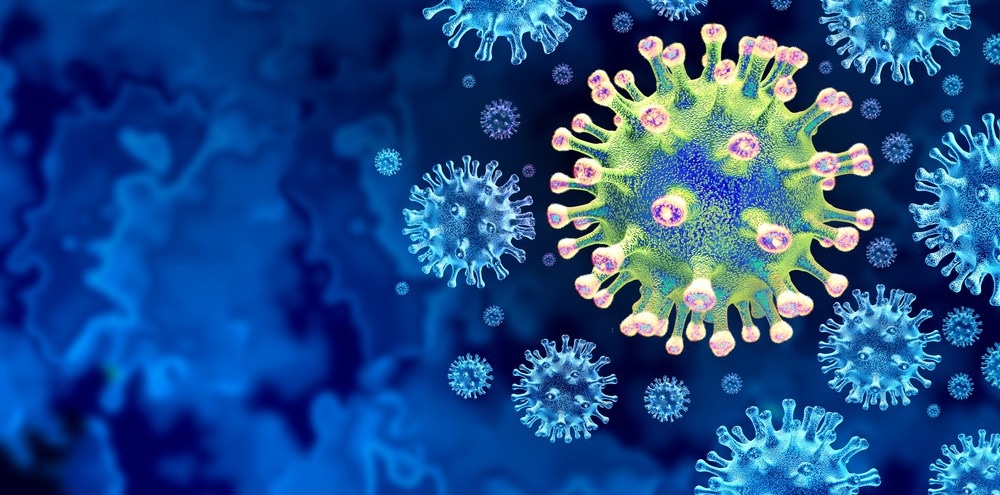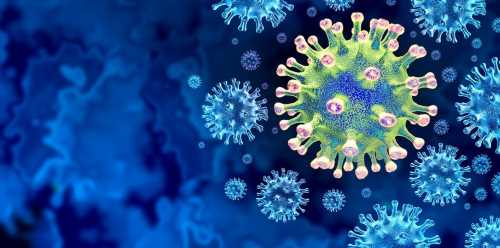In a recent study published in the bioRxiv* preprint server, researchers demonstrated the relevance of the P681H spike (S) mutation in the severe acute respiratory syndrome coronavirus 2 (SARS-CoV-2) Alpha variant.

Background
The emergence of novel dominant SARS-CoV-2 variants of concern (VOCs) challenges the worldwide coronavirus disease 2019 (COVID-19) pandemic responses. In the first part of 2021, B.1.1.7, also known as the Alpha variant of the SARS-CoV-2, first surfaced throughout the United Kingdom (UK) and dominated much of North America and Europe.
Numerous research revealed that Alpha was more contagious among people. Compared to the ancestral SARS-CoV-2 strain, the Alpha S glycoprotein harbored two deletions and seven mutations, including the P681H mutation at the polybasic cleavage region, possibly improving S cleavage.
Mounting evidence indicates that VOCs are being evolved to escape the human immune reflexes, with great attention centered on mutations across the S protein that elude from neutralizing antibody reactions. Nevertheless, successful viral transmission and replication depend on resistance to the host's non-specific immune response.
About the study
In the present study, the authors hypothesized that the modified cleavage domain of SARS-CoV-2 VOCs bearing mutations in the furin-cleavage site (FCS) might have implications on their susceptibility to interferon-I (IFN-I) and IFN-induced transmembrane proteins (IFITMs).
The team differentiated the susceptibility of full-length S pseudotyped lentiviral vector (PLV) entrance of the presently circulating SARS-CoV-2 VOCs in the vicinity of IFITM proteins. They created a D614GΔCT mutant and evaluated infectivity in A549-angiotensin-converting enzyme 2 (ACE2) cells of these PLVs compared to the full-length D614G S as PLVs to see if the elimination of the last 19 amino acids influenced IFITM phenotypes. The investigators examined the IFITM sensitivity of AlphaΔCT to determine if the ΔCT mutation was adequate to surmount the IFITM2 resistance seen with the Alpha S protein.
The researchers aimed to verify that the PLVs and the native Alpha virus had a similar behavior on IFITM-expressing cells. They investigated the theory put forth by others that Alpha was more immune to the influences of IFNβ. The authors explored whether the Omicron, Alpha, and Delta variants entered by the same pathway, considering the mutations at the polybasic cleavage site.
In addition, the scientists determined the significance of the P681H mutation in affording IFNβ and IFITM resistance in the Alpha VOC. Finally, they assessed whether the P681H mutation's reversion might make the Alpha variant susceptible to IFNβ and IFITM.
Results
The study results depicted that of the SARS-CoV-2 Alpha, Gamma, Beta, Delta, Omicron, and Kappa variants, just the Alpha S was immune to IFITM constraint in A549-ACE2-IFITM cells. Further, the team demonstrated that the ΔCT mutation, frequently employed to boost SARS-CoV-2 PLV infectivity, conceals the Alpha PLVs' IFITM resistance by increasing cathepsin reliance. Furthermore, they showed that reversing the P681H mutation eliminates the Alpha variant's resistance to IFNβ in Calu-3 and A549-ACE2 cells.
The researchers illustrated that in lung epithelial cells of humans, the Alpha S protein imparts a degree of resistance to the impacts of IFNβ. This observation corresponds with an evident IFITM3-mediated infection enhancement and resistance to an entrance constraint induced by IFITM2. The primary determinant of this was a proline to histidine alteration at position 681 in S close to the FCS that the team has previously demonstrated to adjust IFITM2 sensitivity.
Additionally, the P681H mutation in the Alpha S protein was necessary for both context-reliant resistance to IFITMs and resistance to IFN. Yet, the reversion of P681H mutation does not decrease the incorporation of cleaved S into particles, implying a function downstream of furin cleavage, even if it seems to impart alterations in susceptibility to endosomal protease suppression associated with an increased cell-surface entry. This inference indicated that conformational modifications in S following cleavage were altering the viral entry mechanism and, consequently, IFN sensitivity.
In sum, the study results emphasize the dynamic characteristic of the SARS CoV-2 S during its adaptation to both adaptive and innate immunity across the human population.
Conclusions
The study findings illustrated that the SARS-CoV-2 Alpha VOC was significantly more type-1 IFN resistant than the parental Wuhan-like strain. This observation connects to resistance to IFITM2, an antiviral protein that prevents viral entry into target cells, and IFITM3, its paralog.
P681H alters SARS-CoV-2's cell entry pathways in the Alpha S glycoprotein, lessening the virus' reliance on endosomal proteases, contrary to other SARS-CoV-2 VOCs. The team found that reverting position 681 to proline in viruses harboring the Alpha S was adequate to restore IFITM2 and IFN sensitivity without decreasing furin-facilitated S cleavage.
The authors concluded that mutations linked to SARS-CoV-2 VOCs might offer replication or transmission benefit via adaptation to withstand non-specific immune processes in the host, apart from conferring adaptive immune escape.
*Important notice
bioRxiv publishes preliminary scientific reports that are not peer-reviewed and, therefore, should not be regarded as conclusive, guide clinical practice/health-related behavior, or treated as established information.
- Lista, M. et al. (2022) "The P681H mutation in the Spike glycoprotein escapes IFITM restriction and is necessary for type I interferon resistance in the SARS-CoV-2 alpha variant". bioRxiv. doi: 10.1101/2022.08.11.503706. https://www.biorxiv.org/content/10.1101/2022.08.11.503706v1
Posted in: Medical Science News | Medical Research News | Disease/Infection News
Tags: ACE2, Angiotensin, Angiotensin-Converting Enzyme 2, Antibody, Cell, Coronavirus, Coronavirus Disease COVID-19, covid-19, Enzyme, Glycoprotein, Histidine, Immune Response, immunity, Interferon, Mutation, Omicron, Pandemic, Proline, Protein, Research, Respiratory, SARS, SARS-CoV-2, Severe Acute Respiratory, Severe Acute Respiratory Syndrome, Syndrome, Virus

Written by
Shanet Susan Alex
Shanet Susan Alex, a medical writer, based in Kerala, India, is a Doctor of Pharmacy graduate from Kerala University of Health Sciences. Her academic background is in clinical pharmacy and research, and she is passionate about medical writing. Shanet has published papers in the International Journal of Medical Science and Current Research (IJMSCR), the International Journal of Pharmacy (IJP), and the International Journal of Medical Science and Applied Research (IJMSAR). Apart from work, she enjoys listening to music and watching movies.
Source: Read Full Article
